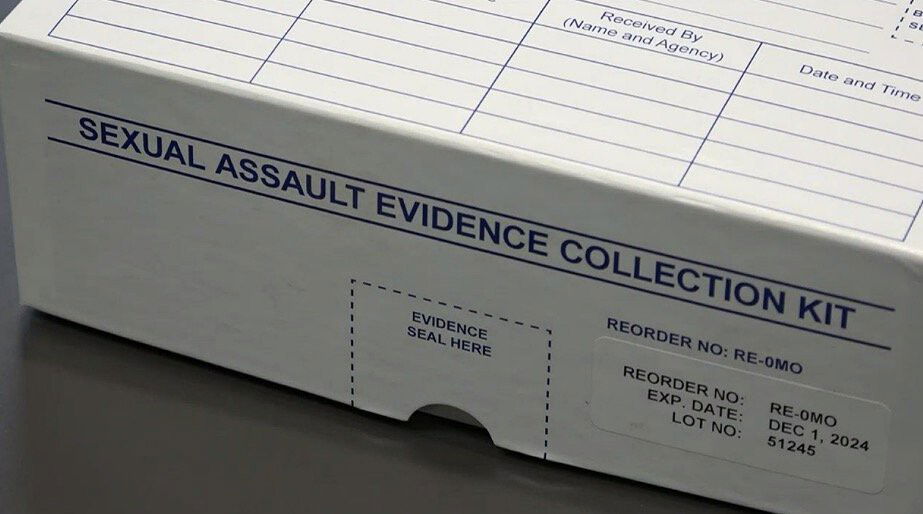Attorney General’s office receives third round of funding to clear backlog of sexual assault kits

New action is underway in the effort to end a backlog of sexual assault test kits in Missouri. New funding will help clear the backlog
By Shoshana Stahl
Click here for updates on this story
ST. LOUIS, Missouri (KMOV) — New action is underway in the effort to end a backlog of sexual assault test kits in Missouri. New funding will help clear the backlog, which sexual assault victim advocates say is a major step forward as some kits have sat in evidence rooms across the state for years.
Missouri Attorney General Eric Schmitt’s office received a third federal grant from the Department of Justice’s Bureau of Justice Assistance, with this grant totaling $2.5 million. The grant will allow continued work on the SAFE Kit Initiative, which aims to clear the backlog of untested sexual assault kits.
The YWCA provides emergency services for victims of sexual and domestic violence. YWCA community engagement manager Samantha Wayant said although this is a step in the right direction, it isn’t a complete fix.
“It’s a betrayal,” Wayant said. “It’s a failure. This should have never happened in the first place.”
Wayant said kits sitting on shelves made it seem to victims that their assault didn’t matter.
“Entrusting in the system and then the system failed them,” Wayant said. “Having that initial revictimization that had occurred so to see that the state is taking this seriously is a step in the right direction.”
News 4 dove deeper into the latest report from the Attorney General’s office.
As of July 15, 2022, these are the number of kits that have been reported to law enforcement and still have to be tested:
St. Charles County: 8 kits still to be tested
St. Louis City: 0 kits still to be tested
St. Louis County: 178 kits still to be tested
Crime Victim Center clinical director Peggy Tyson said that’s hard for the victims who have been waiting years while their kits sat on shelves.
“They have to rip your hair out from the roots in order to get evidence through that safe kit,” Tyson said. “Literally parts of me are just sitting on a shelf for a long time.”
Tyson said the state should never have gotten to a backlog and hopes it never happens again.
“They will be wondering how many other people have been victimized because theirs has sat unprocessed.”
The grant money will also help inventory analysts provide training and onboarding to hospitals and law enforcement to ensure all organizations are users of the electronic sexual assault kit tracking system, SAFETrack. SAFETrack was developed to allow victims and survivors of sexual violence to monitor the movement of their kit through the criminal justice system.
Wayant said there is a barcode on each sexual assault kit, which is put into the system for victims to track as it moves from law enforcement to the testing location.
“This allows a survivor to be empowered through this system to be able to see ‘yes my kit is moving through the system,’” Wayant said. “That this is being taken seriously. That this is being investigated. That the processes are working.”
The 2022 SAKI grant will provide DNA testing for 1,171 additional sexual assault kits, and assist local law enforcement agencies to investigate cold cases by providing Violent Criminal Apprehension Program (ViCAP) data entry and Cold Case Investigators when Combined DNA Index System (CODIS) hits come back from the lab. To date, there has been one conviction obtained on a Missouri SAKI CODIS hit and currently 5 more cases are set for trial.
The three-year National 2022 SAKI grant runs through September 30, 2025 to financially support the final statewide inventory of tested and untested kits in Missouri collected before May 2022.
Prior to this grant, the Missouri Attorney General’s Office received two National Sexual Assault Kit Initiative (SAKI) grants in 2018 and 2020. The 2018 grant fueled the first state inventory of sexual assault kits, the testing of reported, untested sexual assault kits, and the creation of SAFETrack as an evidence tracking system. The 2020 grant funded the second inventory of sexual assault kits, additional testing of reported, untested sexual assault kits and the services of a Cold Case Investigator.
The SAFE Kit Initiative was launched in January of 2019 to inventory all untested sexual assault kits in the state’s backlog, create an electronic tracking system, and send those identified kits to a lab for forensic testing and then to the appropriate authority for potential prosecution.
Please note: This content carries a strict local market embargo. If you share the same market as the contributor of this article, you may not use it on any platform.